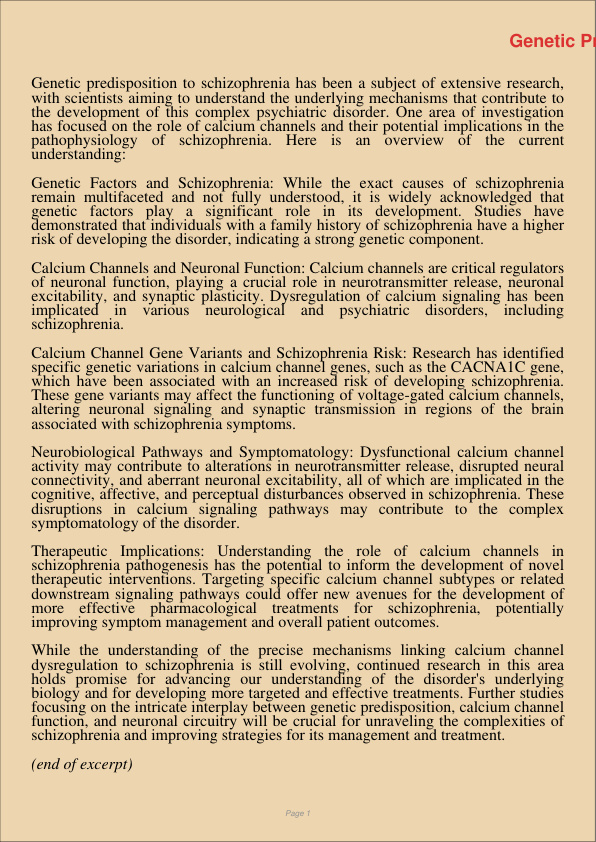Genetic Predisposition To Schizophrenia Understanding The Role Of Calcium Channels
Dec 31, 2023
genetic predisposition
calcium channels
Marketing
Social science
Genetic predisposition to schizophrenia has been a subject of extensive research, with scientists aiming to understand the underlying mechanisms that contribute to the development of this complex psychiatric disorder. One area of investigation has focused on the role of calcium channels and their potential implications in the pathophysiology of schizophrenia. Here is an overview of the current understanding:
Genetic Factors and Schizophrenia: While the exact causes of schizophrenia remain multifaceted and not fully understood, it is widely acknowledged that genetic factors play a significant role in its development. Studies have demonstrated that individuals with a family history of schizophrenia have a higher risk of developing the disorder, indicating a strong genetic component.
Calcium Channels and Neuronal Function: Calcium channels are critical regulators of neuronal function, playing a crucial role in neurotransmitter release, neuronal excitability, and synaptic plasticity. Dysregulation of calcium signaling has been implicated in various neurological and psychiatric disorders, including schizophrenia.
Calcium Channel Gene Variants and Schizophrenia Risk: Research has identified specific genetic variations in calcium channel genes, such as the CACNA1C gene, which have been associated with an increased risk of developing schizophrenia. These gene variants may affect the functioning of voltage-gated calcium channels, altering neuronal signaling and synaptic transmission in regions of the brain associated with schizophrenia symptoms.
Neurobiological Pathways and Symptomatology: Dysfunctional calcium channel activity may contribute to alterations in neurotransmitter release, disrupted neural connectivity, and aberrant neuronal excitability, all of which are implicated in the cognitive, affective, and perceptual disturbances observed in schizophrenia. These disruptions in calcium signaling pathways may contribute to the complex symptomatology of the disorder.
Therapeutic Implications: Understanding the role of calcium channels in schizophrenia pathogenesis has the potential to inform the development of novel therapeutic interventions. Targeting specific calcium channel subtypes or related downstream signaling pathways could offer new avenues for the development of more effective pharmacological treatments for schizophrenia, potentially improving symptom management and overall patient outcomes.
While the understanding of the precise mechanisms linking calcium channel dysregulation to schizophrenia is still evolving, continued research in this area holds promise for advancing our understanding of the disorder’s underlying biology and for developing more targeted and effective treatments. Further studies focusing on the intricate interplay between genetic predisposition, calcium channel function, and neuronal circuitry will be crucial for unraveling the complexities of schizophrenia and improving strategies for its management and treatment.
